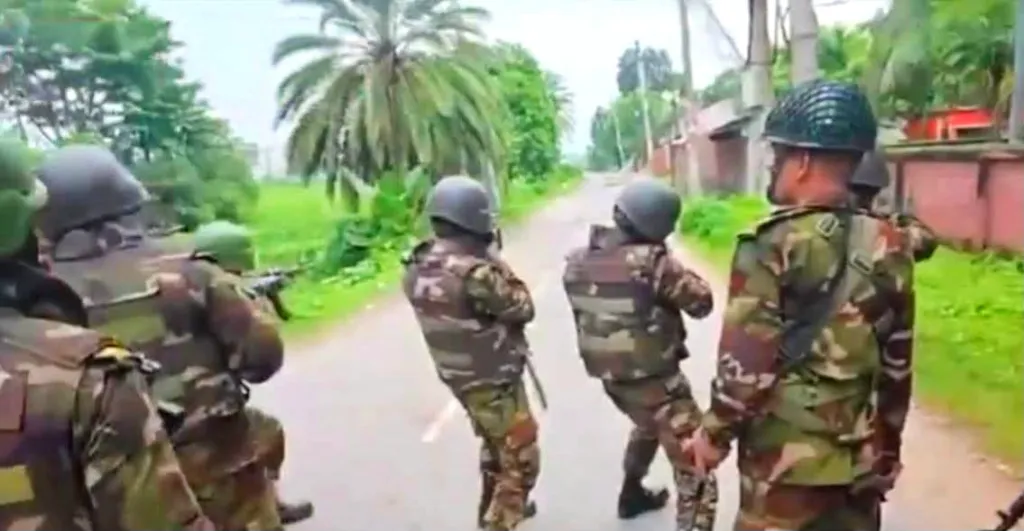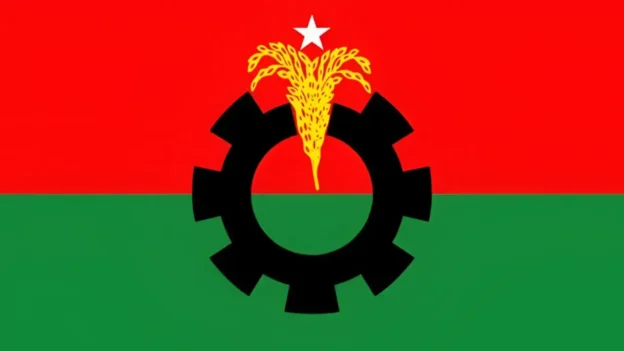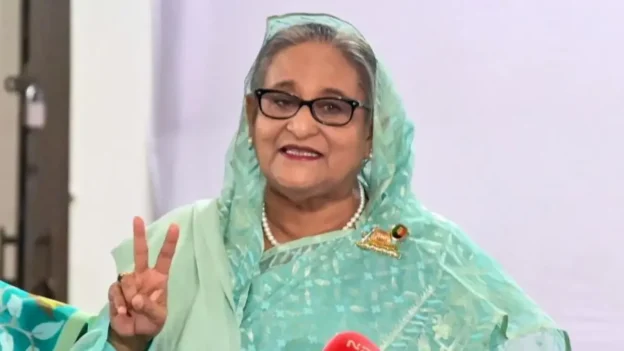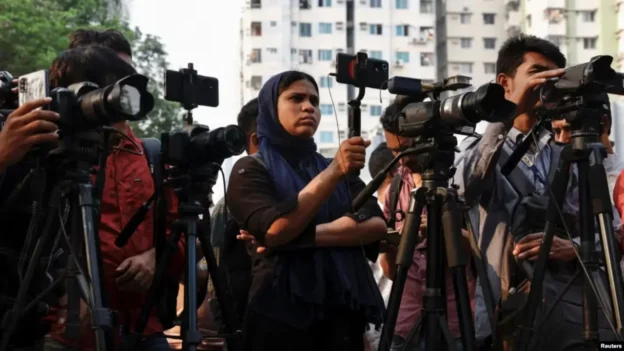At least four civilians were killed and dozens injured in Gopalganj on Wednesday after security forces opened fire during a tense standoff surrounding a controversial rally by the opposition Nationalist Citizens’ Party (NCP), sparking condemnation and intensifying scrutiny over the role of Bangladesh’s military and police in quelling dissent.
Witnesses and local residents said the clash began when a small group of NCP leaders — escorted under heavy army protection — entered the Gopalganj municipal park via an alternate route through Tekerhat, bypassing earlier roadblocks on the Barishal-Kotalipara highway.
Their entry followed violent confrontations earlier that morning in Ulpur, where protesters reportedly set a police van ablaze after officers fled the scene amid rising tensions.
According to residents, only around 40 NCP supporters were present at the park when party leaders Sargis, Nahid, and Hasnat took the stage under military escort following a brief rain.

The site lies adjacent to the dead Madhumati River to the west, and is bordered by the district court, Bangabandhu College, and the Deputy Commissioner’s office.
Eyewitnesses say the speeches, lasting no more than 15 minutes, included incendiary rhetoric against the ruling Awami League, former Prime Minister Sheikh Hasina, and most provocatively, derogatory remarks aimed at the nation’s founding father Sheikh Mujibur Rahman, whose mausoleum lies nearby.
Though initial local reactions were restrained, the inflammatory tone reportedly provoked anger among onlookers, who began moving toward the stage.
As tensions escalated, army and police personnel intervened to block the crowd. Security forces allegedly used batons and live ammunition to disperse them.
In the chaos that followed, Sargis and his team were seen retreating in a police vehicle to the Superintendent of Police’s (SP) office, which was quickly cordoned off by both army and law enforcement.
“The army and police created a riot-like atmosphere to clear the way for NCP leaders to escape,” said one local shopkeeper. “In doing so, they opened fire on innocent bystanders who were not even part of the crowd.”
Among those fatally shot was 18-year-old Ramzan Kazi, a resident of Kotalipara, who had earlier been seen walking beside police officers.

“He never imagined this would be his final walk,” said his father, Kamrul Kazi, who broke down in tears. “My son did nothing wrong. Where will I find my child now?”
Ramzan was one of three unarmed civilians fatally shot near Chourangi intersection, according to locals.
Another victim, Dipto Saha, was struck in the abdomen while walking to his family shop after lunch, his uncle said. “He wasn’t part of any protest. He was just trying to get back to work.”
A third victim, Sohel Molla, a mobile phone vendor at Keramat Ali Plaza in the city, was confirmed dead by fellow shopkeeper Jony Khan, who said he found Sohel’s body after the shooting subsided.
The fourth victim was Emon of Arpara, said Gopalganj district civil surgeon Abu Syeed Mohammad Faruk.
Local accounts suggest the NCP rally participants were bussed in from outside the area. “None of them were familiar faces,” one resident said. “People believe they were paid to show up — not real supporters.”
As local residents massed around the park, the SP office, and nearby government buildings, the army reportedly used armored vehicles to extract the NCP leaders through Ghonapara, a western route out of the city.
Multiple witnesses alleged that soldiers continued firing into the crowd as they cleared the path, resulting in further injuries and fatalities.

“Security forces facilitated the NCP’s escape while suppressing locals who were expressing dissent,” said a human rights defender in Dhaka.
“It was a disproportionate and militarized response to what could have been peacefully defused.”
By nightfall, a curfew was imposed across Gopalganj, and loudspeakers reportedly warned residents not to leave their homes or face consequences.
A stark directive from authorities was repeated across neighborhoods: “Step outside and you will be shot.”
Local sources claim the security operation was coordinated at the highest levels to protect the Yunus administration’s political allies from backlash.
Despite being barely four months old and lacking a substantial grassroots presence, the Nationalist Citizens’ Party (NCP) has emerged as an unusually influential actor—reportedly enjoying direct and preferential access to the chief adviser Mohammad Yunus and key members of the interim cabinet.
Critics allege that the interim government is weaponizing state forces to suppress dissent and fabricate a façade of legitimacy.
Meanwhile, the NCP’s privileged access to the corridors of power has allowed the fledgling party to wield outsized influence over policymaking—marginalizing established political forces struggling to voice their legitimate demands.
Local journalists said countless others were wounded, many too afraid to seek hospital care amid the heightened military presence.
In one particularly disturbing video shared online, an army officer is seen stepping on the lifeless body of a shooting victim — an image that has stirred widespread outrage and drawn comparisons to extrajudicial killings.
“The security forces have become both judge and executioner,” said one local journalist who requested anonymity due to threats. “What happened in Gopalganj was not crowd control. It was a deliberate, state-sanctioned act of violence.”
The Bangladesh Army and police have not commented publicly on the events. Attempts by this news portal to reach the Inter-Services Public Relations (ISPR) and senior Home Ministry officials were unsuccessful.
The incident adds to a growing list of alleged human rights abuses under the Yunus-led caretaker regime.
According to police data, 1,930 people were killed across the country between January and June this year, with June seeing the highest single-month toll of 343 deaths.
With general elections approaching and political polarization at a peak, observers warn the Gopalganj crackdown could fuel further unrest.
“Bangladesh is hurtling toward a crisis of democratic legitimacy,” said a senior professor, at Dhaka University.
“The use of lethal force against civilians — particularly in politically sensitive districts like Gopalganj — represents an egregious failure of state accountability.”
As Gopalganj remains under lockdown, families are left grieving and a nation waits anxiously.
“My son was innocent,” said Kamrul Kazi. “We don’t want politics. We just want justice.”

